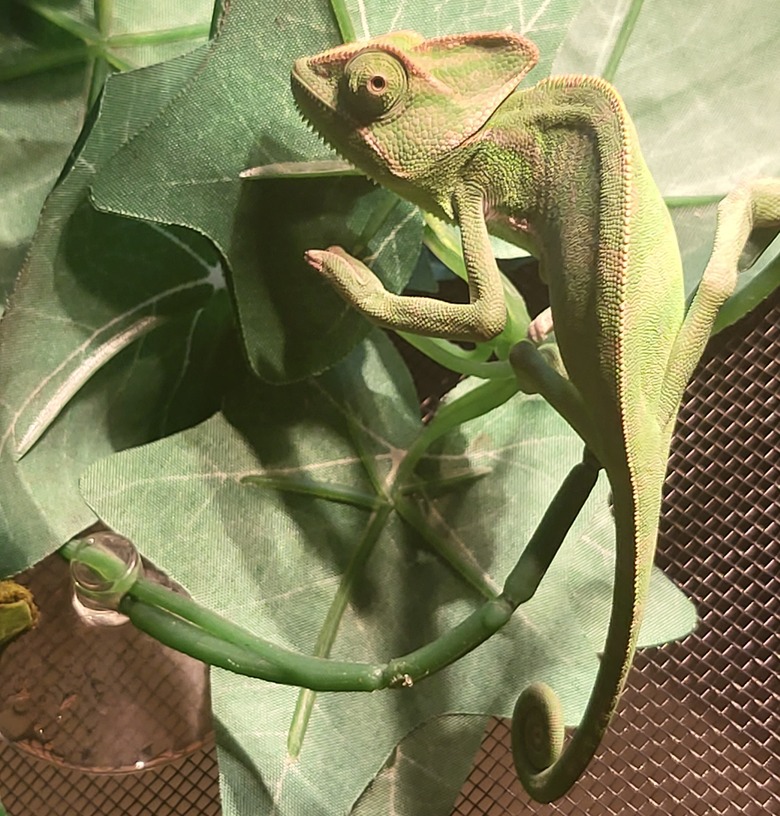How To Take Care Of A Chameleon's Eye Infection
Chameleons are a popular pet reptile, but many species, including the veiled chameleon, have eye problems. If you suspect your chameleon has an eye infection, be sure to contact your vet right away and apply saline and antibiotics as directed. Also, be sure that your chameleon is getting proper nutrition.
Symptoms of chameleon eye infections
Symptoms of chameleon eye infections
Chameleons are typically able to clean out their own eyes with the fluid around the eyes. You may notice that your chameleon is squinting or has a slightly bulging eye; this is likely completely normal. However, if these symptoms are severe or last for more than 24 hours, she may have an eye infection.
Other symptoms of infection include a chameleon whose eye is swollen or who keeps one eye closed. You may also see fluid from the eye, or your chameleon may try to rub the affected eye because it is painful or uncomfortable. Infections may also cause your chameleon to stop eating.
Causes of veiled chameleon eye problems
Causes of veiled chameleon eye problems
A bacterial eye infection is a common cause of eye problems, but there are other conditions that may cause problems or leave your chameleon more susceptible to infection. For example, a scratched eye or foreign body in the eye may cause swelling and a closed eye. Poor ventilation in his habitat can cause eye problems and make it more likely that dirt in the air may scratch his eye.
Be sure to check your chameleon's diet as well. A deficiency of vitamin A and dehydration can also lead to eye problems. Vitamin A deficiency may be accompanied by a closed eye. If your chameleon is dehydrated, the eye turrets will likely be sunken in rather than swollen. Sunken eyes may also be a sign of some sort of distress, such as a chameleon being egg-bound.
Treating eye infections in chameleons
Treating eye infections in chameleons
First, consult your veterinarian to confirm that an eye infection is in fact the cause of the symptoms you are seeing. Don't hesitate to make an appointment, as eye problems can occur suddenly, and your pet has the best chance of a full recovery with prompt treatment.
Use a saline solution to wash out the eyes to clear any debris that may be irritating your chameleon. If an infection is the cause, your vet will prescribe an antibiotic. Follow your vet's instructions to administer the medication.
Resolving other eye problems in chameleons
Resolving other eye problems in chameleons
Other veiled chameleon eye problems will not require antibiotics at all. For example, if your chameleon has a vitamin A deficiency, she needs supplemental vitamin A to resolve the problem. Be sure to discuss your chameleon's diet with your veterinarian to ensure she is getting the nutrients she needs so that the problem does not reoccur. Unless there is an underlying medical condition, a dehydrated chameleon will recover with some food and water and plenty of rest.
Prevent future eye problems in chameleons
Prevent future eye problems in chameleons
Proper care will help minimize any health problems your chameleon may face. An automatic misting station in his enclosure will give him more opportunities to rinse and clean out his eyes, although you can mist him manually as well by giving him a shower each week.
Make sure he is getting a proper diet and has access to water to stay hydrated. Keep the enclosure clean and well ventilated. Make sure to keep his enclosure at a suitable temperature. For veiled chameleons, this is between 72 and 78 degrees Fahrenheit with a basking area that is 85 degrees. Decrease the temperature at night.
